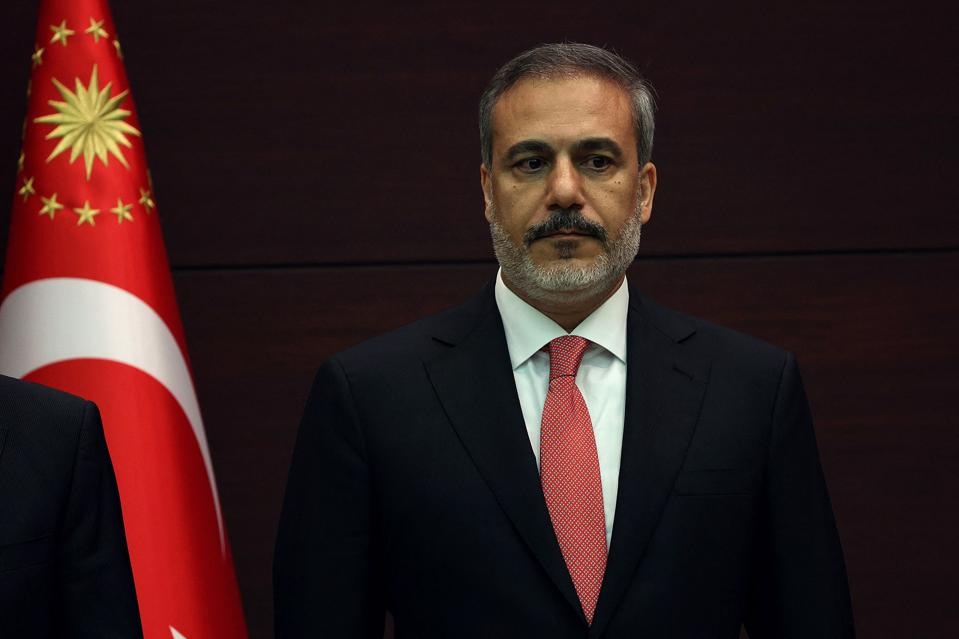Fidan: Dialogue with Conditions, Threats, and Political Games in the Greek-Turkish Dispute
Geopolitical tensions in the Aegean and Greek-Turkish relations flare up anew with the recent statements of Turkey’s Foreign Minister, Hakan Fidan. In an interview with the pro-government channel ULKE TV, the Turkish diplomat mixed an invitation for dialogue with harsh rhetoric and warnings, revealing the core of Ankara’s political strategy toward Athens.
With the phrase “I don’t accept 12 miles, you don’t accept 6”, Fidan pinpointed the main sticking point in the Aegean — the extension of territorial waters. He emphasized that the issue is not unsolvable despite deep disagreements, while noting that the real problem is the fear among Greek governments that resolving these disputes will carry political costs.
This observation is not incidental: the Turkish leadership aims to turn the Greek public and political system against a solution, portraying resolution as a “political risk” Greece hesitates to take.
Ankara’s Diplomatic “Game”: From Attack to Dialogue
Despite harsh accusations against Greece for an “anti-Turkish stance” and its unilateral efforts to involve itself in the EU’s SAFE security mechanism, Fidan tried to present Ankara as “open to peaceful dialogue.” His reference to Greece’s historical NATO withdrawal and re-entry in 1980 implies Turkey’s tolerance and willingness for compromise, but on its own terms and conditions.
At the same time, however, the warnings about “retaliation” in case of hostile rhetoric show that Ankara will not easily back down on its “red lines.”
Fidan accused Greek politics of being fueled by internal disputes and “anti-Turkism” as a survival tool, stating that Turks and Greeks are “ancient peoples of the region” who need to move beyond deadlock.
Athens’ Response: Unyielding on National Rights
From the Greek side, the response came immediately and decisively through Minister of State Giorgos Gerapetritis, who stressed that Greece pursues an “active and consistent foreign policy based on international law,” while emphasizing that “there can be no negotiation or concessions on matters of national interest.”
This stance confirms Greece’s commitment to a firm position where its rights in the Aegean and Eastern Mediterranean are considered non-negotiable.
Geopolitical Analysis: Greece and Turkey on a Razor’s Edge
Ankara’s stance reveals a dual-track strategy:
- On one hand, it keeps open the possibility of dialogue and negotiation, presenting itself as a moderate power seeking solutions.
- On the other, it intensifies pressure and threats, leveraging political and military means to seek revision of the existing balance in the Aegean.
Greece, however, insists on rhetoric of stability and defense of its rights, warning that it will not back down on national issues.
Maintaining this balance in the sensitive geopolitical Aegean zone depends on internal political stability and determination on both sides, with political will playing a decisive role in avoiding escalation.
Political Overview and Future Prospects
Fidan openly expressed hope that as long as Kyriakos Mitsotakis remains in power, there is a window of opportunity for resolution. The message is clear: Ankara considers the political leadership and balances in Greece crucial for the evolution of bilateral relations.
However, the Greek political scene seems unwilling to concede national rights, while the internal political climate tends to worsen mistrust and harden stances.
The Greek-Turkish Relationship — A Dangerous Balance
Fidan’s statements highlight the persistent deadlock in Greek-Turkish relations: the need for dialogue and resolution clashes with political fears and rivalries, making the Aegean one of the most explosive geopolitical hotspots in the wider region.
Turkey uses threatening rhetoric as leverage but simultaneously projects willingness to resolve differences if Greece overcomes its “fears.” Greece, however, remains steadfast on national issues, leaving open the possibility of a deadlock that could lead to renewed tensions.
In any case, managing this fragile balance will require calm, political seriousness, and most importantly, sincere willingness for dialogue and respect for international law to avoid dangerous escalations that would harm the entire region.
Source: pagenews.gr
